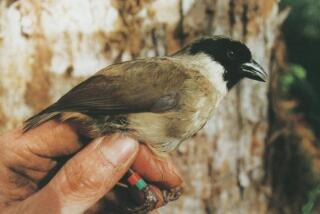Focus Shifts in Species Protection
Great white sharks, the ocean’s most fearsome predator, could be granted worldwide protection from human predators at an environmental summit in Thailand now being held to decide the fate of some of the planet’s most threatened and lucrative animals and plants.
At the meeting, which began Saturday in Bangkok and will continue through Thursday, 166 nations are debating restrictions on the sale and purchase of four dozen species.
The Convention on International Trade in Endangered Species of Wild Fauna and Flora, or CITES, previously has focused on large mammals such as elephants, tigers and rhinoceroses, coveted for their ivory, skins and horns. But as commercial pressures weigh on oceans and forests, nations increasingly are debating international protection for fish and trees.
Proposals are being considered to add or tighten trade restrictions on white sharks, a reef fish called the humphead wrasse, the Irrawaddy dolphin that lives in shallow waters of the Indian Ocean and southern Pacific, and agarwood and ramin trees. Agarwood trees produce oils used in perfume and ramin are among Southeast Asia’s highest-earning timber exports.
Feared by surfers and vilified in Hollywood films, great white sharks occasionally prey upon humans. But, in reality, more sharks are killed by people than vice versa. Their teeth and jaws are prized collectibles that enter trade worldwide, both legally and illegally. One jaw from South Africa, recently stolen, was valued at $50,000, and each tooth can cost $600, according to a CITES report. The meat and fins are also prized in some countries.
Trade and commercial fishing of white sharks is already prohibited in the United States, South Africa, Australia, Namibia and Malta. Few, if any, nations have commercial fisheries for them, though sportfishing is popular, and some are caught accidentally in nets.
The species may have declined more than 20% in some areas over the last 30 years, according to a CITES report based largely on sportfishing data in Australia. Perhaps because of their low reproductive rate, great whites are rare compared with other sharks.
Australia and Madagascar have proposed to list the sharks on the treaty’s Appendix II -- which means that they are not necessarily at risk of extinction but that current levels of trade may threaten their survival. The proposal would ban such exports.
The United States supports the proposal. However, it has recommended a change in the proposed zero quota to allow the capture of some sharks for scientific research.
Japan opposes the additional protection being proposed, saying there is no global population estimate for the sharks and little evidence of trade.
Delegates from some nations argue that CITES protection shouldn’t include ocean fish because other international laws govern fisheries. However, basking sharks and whale sharks were listed under CITES at the last summit two years ago.
Participants are meeting in committees this week before convening to vote on specific proposals next week.
Kenneth Stansell, chairman of the CITES standing committee and head of the U.S. delegation, opened the summit by noting that none of the 33,000 species protected by the treaty has gone extinct since it took effect 30 years ago.
Yet CITES Secretary-General Willem Wijnstekers warned that “we are in danger of losing the war against wildlife crime, especially for some very rare animals and plants,” unless law enforcement improved, with better training, more equipment and international investigations.
A panel of experts reported that poaching and trafficking of wildlife had become increasingly sophisticated and organized. Smuggled products such as tiger skins, caviar, Tibetan antelope wool and ivory often are worth more per pound than cocaine or heroin, so the trafficking has attracted organized crime.
Illegal wildlife trade -- estimated at billions of dollars a year -- is the second biggest threat to endangered species, after destruction of their habitat. Hunting or trade of most protected species is not entirely prohibited under CITES. Instead, specific quotas are set for particular goods, such as rhinoceros trophies and leopard skins.
Although white sharks are arguably the most well known of the species under consideration, others are more controversial and economically important. Claire Doole of the World Wide Fund for Nature said that ramin trees and humphead wrasse were of particular concern.
The wrasse, which can grow 6 feet long, is declining throughout the Indo-Pacific coral reefs where it lives. The United States tried unsuccessfully to restrict trade in wrasse two years ago.
The ramin tree, a tropical hardwood, has been severely depleted by illegal logging. Indonesia, its biggest exporter, wants international trade tightened, to protect not only the trees, but also the tigers, orangutans and other animals that live in the rainforests. A variety of products, from cabinets to window blinds, are crafted from the whitish timber. The U.S. has not taken a position on it.
More to Read
Sign up for Essential California
The most important California stories and recommendations in your inbox every morning.
You may occasionally receive promotional content from the Los Angeles Times.










